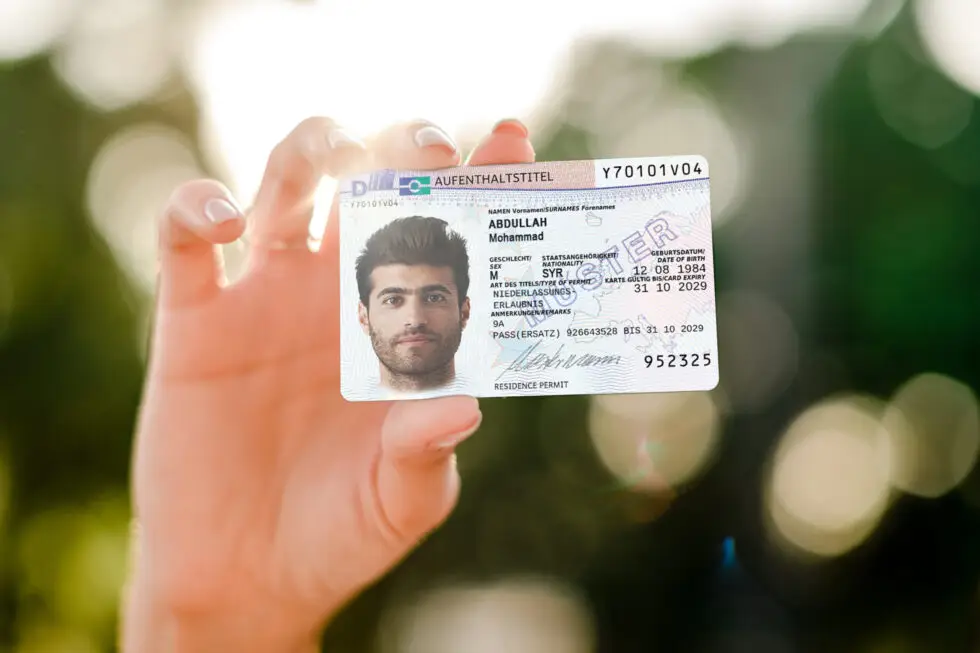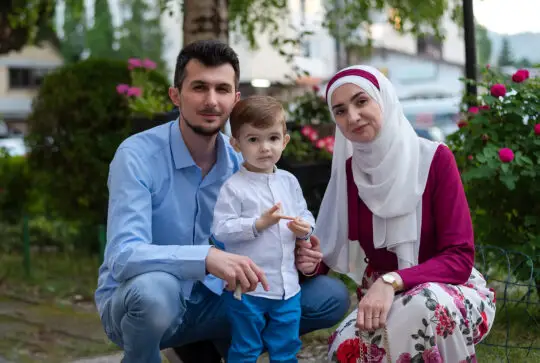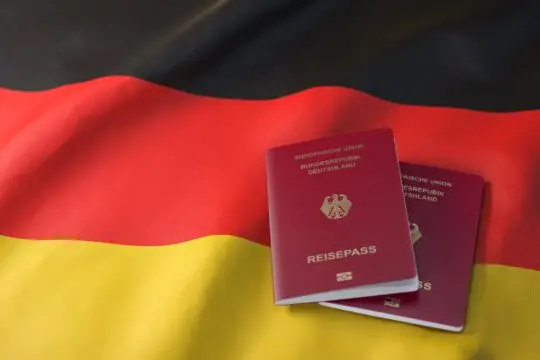What does § 25 para 5 AufenthG mean?
To get started with the topic of your Residence permit , it is important for you to know the background to your Residence permit Section 25 (5) Residence Act and why it exists at all. It is also crucial that you understand why you, of all people, have been granted this Residence permit and what exactly constitutes this Residence permit .
Why do you get § 25 para 5 AufenthG?
Residence permit Section 25 (5) AufenthG is very closely linked to the topic of Tolerance permit . Above all, the issue of deportation is crucial. This deportation is not possible for holders of Section 25 (5) AufenthG for various reasons.
Via Residence permit , these people, who have often been in a Tolerance permit for a long time, are given the opportunity to build up their prospects in Germany.
The reasons why your deportation was not possible are set out very precisely and Foreigners' office has the task of checking exactly whether the specified reasons apply to you. In addition, there are other important conditions that must be met in order to be eligible for § 25 Para. 5 AufenthG.
Who receives Section 25 (5) AufenthG?
As the name suggests, the Residence permit for foreigners who are required to leave the country is issued to foreigners who are required to leave the country. With such a Residence permit you have been in a Tolerance permit for a longer period of time. As the holder of the residence permit, you cannot be deported from Germany to your home country for legal or factual reasons.
These legal or factual reasons are decisive for your right of residence and these points will also be closely examined when you receive your residence permit.
The most important characteristics of holders of a residence permit in accordance with Section 25 (5) AufenthG are therefore a long stay in Germany with a Tolerance permit and the existence of legal and factual reasons that speak against deportation.
What kind of Residence permit is Section 25 (5) AufenthG?
Residence permit Section 25 (5) AufenthG is an integration law Residence permit. It gives people who have generally been in a Tolerance permit light in accordance with Section 60b AufenthG for a long period of time the opportunity to obtain a legal right of residence.
The purpose of Residence permit is to integrate these people in Germany and offer them prospects if they meet the requirements. With the change to Residence permit in accordance with Section 25 (5) AufenthG, there is an opportunity to obtain more planning security. The uncertainty associated with the tolerated status is over once this right of residence has been obtained.
Naturalization with § 25 para 5 AufenthG?
How do you obtain Section 25 (5) AufenthG?
The application for and preparation of Section 25 (5) AufenthG has a specific procedure. It is helpful if you are familiar with the procedures. This will give you a specific plan that you can use as a guide to organize your application and check for yourself exactly where you are now.
This is how the application for Section 25 (5) AufenthG works
First of all, it is important that you organize the necessary documents for the application. The next step is for you to sort through these documents and then contact the Foreigners' office that is responsible for you.
Now make an appointment with the authority to submit your documents and ask for a sample application form such as the sample provided by the Thuringia Refugee Council. The structure of these applications can always vary depending on the federal state or authority.
Once you have written the application and have the documents for the application together, it is always a good idea to check the complete application again. It is then important that you arrive on time at the agreed appointment with the immigration office and hand in your application.
Examination of the application for Section 25 (5) AufenthG
Once you have submitted the application, the processing time for the Foreigners' office begins. The Foreigners' office is now obliged to review your application for Section 25 (5) AufenthG within 12 weeks.
If there is no response within these 12 weeks, you as the applicant have the right to submit an Lawsuit for failure of act . The administrative court will then set the authority another deadline and you will then receive the result of your application.
During the examination, Foreigners' office will check whether you meet the requirements for the granting of § 25 Para. 5 AufenthG. All of your evidence and documents will be checked and a decision will then be made as to whether you will be granted Residence permit .
Granting of § 25 para 5 AufenthG
In most cases, the Foreigners' office will contact you and inform you that your application for a residence permit under Section 25 (5) AufenthG has been accepted. You will then also receive a card for Residence permit and are then in possession of a legal right of residence.
In a few cases, you may receive a negative response to your application. In such situations, you have the option of appealing against this decision. When lodging a complaint, it is important that you observe the deadline of 2 or 3 weeks after the decision.
You must then file the action in the order of the instances of administrative jurisdiction (VG, OVG and BVG). The above-mentioned deadlines also apply to each action.
If you fail in all three cases, you will not be able to obtain the Residence permit in accordance with Section 25 (5) AufenthG. The decision is then final and can no longer be appealed.
The Residence permit § 25 Para. 5 AufenthG is initially granted for 6 months. After 6 months, your requirements for the Residence permit will be reviewed again. It will then be extended twice for 6 months each time. You will then have reached the 18 months with § 25 Para. 5 AufenthG.
If the 18 months were obtained with the Residence permit , then the 3rd extension can be granted on the legal basis of § 26 AufenthG may be issued for up to 3 years. The decision depends on your actual or legal reasons, the expiration date of your passport or the respective case officer.
Revocation of § 25 para 5 AufenthG
If key points relating to Residence permit Section 25 (5) AufenthG no longer apply, revocation proceedings may be initiated in accordance with Section 51 (1) No. 4 AufenthG.
Alternatively, Foreigners' office can also withdraw your Residence permit in accordance with Section 51 (1) No. 3 AufenthG. There must be certain serious reasons listed by the authorities against you for this.
Reasons for this may be a serious criminal record, but another possibility may be if a deception in relation to the granting of your residence permit is subsequently discovered.
Another reason may be if you have committed crimes that have made you a danger to the general public or the Federal Republic of Germany.

The requirements for Section 25 (5) AufenthG
The requirements for Section 25 (5) Residence Act have changed, particularly in the area of passport requirements. Here, applicants benefit from changes that have been introduced for people for whom it is not feasible to organize a valid passport.
To organize your documents, it is important that you memorize the requirements. The documents consist of evidence for the respective conditions.
There are factual or legal grounds against deportation
The most important points for the issue of a residence permit in accordance with § 25 Para. 5 AufenthG are that you have factual or legal grounds against deportation. What are these reasons?
The actual reasons why your deportation is impossible are summarized below:
- Passportlessness (no passport can be organized).
- The target state is not willing to accept the transfer.
- Transportation is not available.
- The person is not fit to travel (the journey is not physically reasonable).
- Factual roots in Germany
There are also legal reasons that speak against a deportation and because of which a departure of tolerated persons does not work. These legal reasons are as follows:
- Upcoming marriage
- Deportation is not legally possible during maternity leave
- Deportation is legally impossible in the case of deportation bans under Section 60 AufenthG.
- If family life is unreasonably impaired.
- If you are the parent of a child who lives with you.
If you have these reasons, then deportation is impossible and accordingly you have a prerequisite for applying for Section 25 (5) AufenthG.
Positive integration prognosis for Section 25 (5) AufenthG
Securing your livelihood is another important condition for obtaining Section 25 (5) AufenthG. The Foreigners' office must therefore have a forecast of your ability to secure your livelihood. This may also be a forecast for the future.
It is important that you provide as much evidence as possible as to why your integration in Germany will be a success. The easiest way is if you can prove that you have an employment contract and are working.
However, good grades that indicate that you have completed an apprenticeship or a course of study are also possible. As a general rule, Foreigners' office must be convinced that you as the applicant will be able to manage and secure your own life in the future.
No grounds for refusal for the granting of Section 25 (5) AufenthG
There must be no reasons for refusing to issue a residence permit. Reasons for refusal are, for example, deception of the authorities in the past. So if you have deceived the authorities in the past when providing official information, it is very difficult to obtain the Residence permit § 25 Para. 5 AufenthG.
Other grounds for refusal can be a lack of cooperation with the authorities. If you are uncooperative and refuse to provide the information required to leave the country, or if you do not cooperate in establishing your identity, these are also grounds for refusing to grant you a residence permit under Section 25 (5) AufenthG.
Another reason may be if you deliberately withhold documents from Foreigners' office that could lead to your return home. A reason to deny you Residence permit may also be if you do not sign a declaration of voluntariness requested by the embassy of your country of origin.
There are no impairments for the awarding of contracts
Another important point in the conditions for Section 25 (5) AufenthG is that there are no reasons that would impair the granting of the residence title to you. Such impairments are, for example, serious criminal convictions. If you are in such a situation, you cannot be granted Residence permit in accordance with Section 25 (5) AufenthG.
However, impairments can also be reasons for refusal listed above with regard to your cooperation with Foreigners' office. For this reason, it is particularly important that you always communicate cooperatively with Foreigners' office and cooperate in all official matters that need to be clarified.
Proof of the attempt to obtain a passport for Section 25 (5) AufenthG
It used to be the case that the passport requirement was one of the conditions for the granting of Section 25 (5) AufenthG. With the introduction of § 60b AufenthG, this condition has changed. It is now possible for you to prove that you have made an effort to obtain a passport instead of a passport.
What applies to obtaining a passport also applies to obtaining a replacement passport. You must be able to prove that you have tried to organize a valid passport replacement document. It is therefore crucial that your efforts can be proven.
In some cases, it is not possible to obtain a passport or a replacement passport. However, these cases must also be proven and are then also accepted as a requirement.
Clarification of identity and entry with the necessary visa
It is important for the award that your identity is fully clarified. If it is not possible to clarify your identity despite your best efforts, you will also need proof of this attempt to clarify your identity.
These cases occur, for example, if the embassy of your home country does not issue new passports or if, as in the case of Eritrea, you have to make a declaration of repentance that is unreasonable for you.
It is also important that you can prove that you entered Germany with the required visa and that everything went according to the rules and that you entered Germany with the required visa and did not enter Germany illegally.

The advantages of Section 25 (5) AufenthG
The Residence permit Section 25 (5) Residence Act has a number of advantages. These positive aspects mainly concern the type of residence permit and the issues of working and traveling with this Residence permit. It is important to memorize these positive aspects. This way you can benefit from the advantages and reap the benefits.
§ Section 25 (5) AufenthG is lawful for the duration of residence
Your Residence permit is a legal Residence permit. This means that your periods of residence with this right of residence will be taken into account for the Settlement permit and later for the Naturalization . What was previously not possible with your tolerated status is now possible with Residence permit Section 25 (5) AufenthG.
For example, you have the opportunity to switch directly to Settlement permit if you meet all the requirements. You can then take the final step of applying for German citizenship via Settlement permit .
Unrestricted gainful employment with Section 25 (5) AufenthG
It is generally possible for you to work with your Residence permit . It does not matter whether you are working on a temporary or permanent basis or are self-employed. The legal basis for this is § 4a AufenthG on the gainful employment of foreigners in Germany.
With regard to possible benefits, the decisive factor for you is when your deportation was suspended.
If your deportation was suspended less than 18 months ago, you are entitled to basic benefits in accordance with § 3 AsylblG for the first 15 months without gainful employment in accordance with § 25 Para. 5 AufenthG. From the 16th month you are then entitled to analogous benefits in accordance with § 2 Asylblg and from the 18th month with your Residence permit you are entitled to SGB II / SGB XII.
Travel with § 25 para. 5 AufenthG
Traveling with your Residence permit is no problem. Unlike Tolerance permit, where you could not travel outside Germany, you can travel both inside and outside Germany. You can travel to and stay in EU countries for 3 months within a 6-month period.
You can also travel to your home country without any problems if you have a legal residence permit in accordance with § 25 Para. 5. You do not have to worry about getting into trouble because of your residence permit and can visit your relatives with peace of mind.
The disadvantages of Section 25 (5) AufenthG
In addition to advantages, your Residence permit also has negative aspects. The more thoroughly you are informed about these negative points, the better. This way, you can prepare for these situations and save yourself trouble and stress.
§ Section 25 (5) AufenthG is blocked for Naturalization
As positive as the fact that you have a legal Residence permit is, this fact does not help you for the Naturalization . Your Residence permit is blocked for the application to Naturalization in accordance with Section 10 StAG. What does this mean? You cannot apply for Naturalization directly via your Residence permit and must change Residence permit to do so.
Family reunification is impossible under Section 25 (5) AufenthG
Family reunification is not possible with your Residence permit . According to the legal basis § 29 (3) AufenthG, family reunification is blocked for § 25 (5) AufenthG. This means that family reunification will not be possible until you have changed to Settlement permit .
It is still worthwhile to meet all the requirements for this point in time. Your family reunification can then work in this way if you have changed to Settlement permit after 5 years and no longer have the Residence permit § 25 Para. 5 AufenthG.
Restriction of some benefits at the start of the residence permit
You cannot receive some benefits, such as child benefit or parental allowance, at the beginning of your time with Residence permit § 25 Para. 5 AufenthG.
You must live in Germany with your Residence permit for 3 years before you can apply for child benefit and even then there are strict regulations in this regard. The exception is if Directive 2011/98/EU applies; this varies depending on the case.
You can also only apply for parental allowance or childcare allowance after 3 years. The same rules apply here as for child benefit. With regard to educational grants such as BAföG, you can only apply and be entitled to them after 4 years in accordance with § 25 Para. 5 AufenthG. Exceptions to this are hardship regulations.

The path from § 25 (5) to Settlement permit
In contrast to Naturalization , it is possible to switch from Section 25 (5) to Settlement permit without a change. The Residence permit is not blocked for the application to Settlement permit . It is important that you meet all the requirements and that your application, including all documents, is complete.
The steps for applying under Section 25 (5) AufenthG
The first step, as with the application for all Residence permit , is to organize all the documents for the Settlement permit application. At the same time, it is a good idea to contact the Foreigners' office responsible for you and make an appointment to submit the documents and obtain the application form for the Settlement permit .
Then complete the Settlement permit form in full and check again that your application, including all documents, is really complete. Then attend the agreed appointment and submit your complete application to Foreigners' office .
If necessary, submit an application to Lawsuit for failure of act. Foreigners' office will process your application and provide you with feedback no later than after you have submitted the application. In most cases, you will receive a positive message about your change and receive the card for your new Residence permit and the change to Settlement permit will have been successful.
The documents for the application with § 25 para 5 AufenthG
The legal basis for the documents for the application for Settlement permit is Section 26 (4) AufenthG in conjunction with Section 9 (2) sentence 1 AufenthG. Section 9 AufenthG specifies exactly which conditions you need for Settlement permit and you will need the corresponding proof of the conditions.
The documents for Settlement permit are defined as follows:
- Proof of B1 certificate
- Proof of 60 months of pension insurance payments
- Proof of sufficient living space
- Proof of a successful naturalization test
- Proof of clarification of identity
- Proof that you have been in possession of your residence permit for 5 years
- Proof of livelihood
- Proof that you pose no danger and have no criminal record.
- Proof of your employment contract (permanent employment).
The path from Section 25 (5) AufenthG to the Naturalization
You have to take a detour from Section 25 (5) AufenthG to Naturalization . As Naturalization is blocked for your Residence permit , the direct route does not work. You can then submit the application for Naturalization from Settlement permit without any problems.
Change from Section 25 (5) to a legal right of residence
After 5 years, you can take the first step towards your Naturalization . You apply for a change from § 25 para. 5 to Settlement permit. Ideally, you have already organized the documents over a longer period of time and can therefore deal with the situation in a relaxed and stress-free manner.
Once you have received a positive decision for the Settlement permit , you can immediately check which documents you still need for the Naturalization . Many of the documents required for the Settlement permit are also requirements for the Naturalization. This means that you will also have less stress during this step.
Filing an application after leaving Section 25 (5) AufenthG
First of all, obtain the remaining necessary documents. This is the signed declaration of loyalty with the commitment to the free democratic basic order.
Then sort all the documents, which must look like this:
- Signed declaration of loyalty and commitment to the free democratic basic order
- Proof of legal residence in Germany (5 years with the new Naturalization Act)
- Proof to clarify your identity
- Proof of successful naturalization test
- Proof of livelihood
- Proof of language certificate B1
Then organize the application form for Naturalization and fill it out completely. Now organize and sort the documents. Then submit your complete naturalization application. If necessary, submit an Lawsuit for failure of act.
At the end of your journey, you will receive positive news about your Naturalization and the date for receiving your naturalization certificate. You will be presented with a certificate and from now on you are a German citizen.
Summary
The topic of Residence permit Section 25 (5) AufenthG is very complex. We have summarized the most important points for you below:
- The Residence permit Section 25 (5) AufenthG is issued to foreigners who have been in a Tolerance permit for a longer period of time.
- The most important requirement is that the applicant has a factual or legal reason that prevents deportation.
- Another important condition is a positive integration forecast from Foreigners' office.
- Family reunification is impossible under Section 25 (5) AufenthG, as Residence permit is barred from family reunification under Section 29 (3).
- Traveling with § 25 para. 5 AufenthG is unproblematic, both in Germany and abroad, the important thing is that a valid passport can be presented.
- You cannot go directly to Naturalization under Section 25 (5) AufenthG. The reason for this is that Residence permit is blocked for Naturalization . The Residence permit must therefore be changed first.
- The Settlement permit can be applied for without difficulty under Section 25 (5) AufenthG if the requirements are met.
- Some social benefits such as child benefit, BAföG and parental allowance are subject to restrictions at the beginning with Residence permit .
Settlement permit with Section 25 (5) AufenthG?
FAQ - The most important questions and answers on Sec. 25 (5) AufenthG
§ Section 25 (5) AufenthG is a Residence permit for people who have been in a tolerated status for a long period of time. These people also have a factual or legal reason that speaks against deportation. § Section 25 (5) AufenthG is intended to give these people the opportunity to integrate in Germany.
People who have had a Tolerance permit for a longer period of time and whose deportation is not possible for legal or factual reasons are given the opportunity to submit an application to Residence permit § 25 para. 5.
No. To apply for Naturalization , you must first change your Residence permit in accordance with Section 25 (5) AuFenthG. Ideally, you should switch to Settlement permit. You can easily apply for Naturalization from Settlement permit .
Yes, you can submit your application to Settlement permit after 5 years. Unlike Naturalization , your Residence permit is not blocked for Settlement permit .
No. Family reunification for Section 25 (5) AufenthG is blocked by the legal basis in Section 29 (3) AufenthG. You are therefore forced to change your Residence permit so that you can successfully apply for family reunification.
Yes, you can work with your Residence permit without any difficulties. Regardless of whether it is a temporary job, a permanent job or self-employment. The legal basis for you here is § 4a AufenthG. This states that gainful employment is possible with any legal residence status and is not prohibited.
Yes, you can travel both in Germany and abroad. You can also travel to your country of origin. It is important that you always have a valid travel document with you for your trip in addition to the Residence permit . The valid travel document is a basic requirement for the trip.
The Residence permit § 25 para. 5 is initially issued for 6 months. After that, an examination will take place and your requirements will be checked. The Residence permit will then be extended twice for a further 6 months. After these 2 extensions, it is possible to extend the permit for up to 3 years in accordance with § 26 AufenthG.





